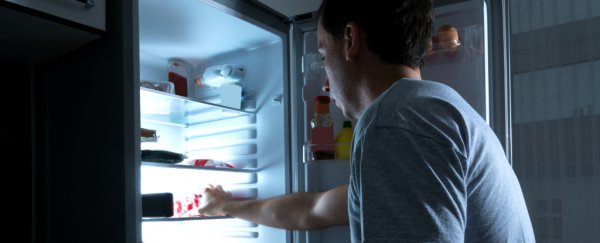Here's what a typical weeknight looks like for me: I get home around 8pm, throw together some 'dinner' (usually leftovers or something from the freezer), watch a few episodes of a show on Netflix, and go to bed. For many of us, this nighttime meal is the most substantial thing we eat all day.
That's a big problem, at least according to recent research. Take a 2013 study of 420 overweight and obese people enrolled in a five-month weight loss program, for example. It found that "late eaters" (people they classified as eating their biggest meal after 3pm) lost significantly less weight - and took longer to lose it - than "early eaters", those who ate their main meal before 3pm.
And a 2005 study of the night-time noshing habits of 350 people found that eating dinner within t3 hours of bedtime was positively linked with a risk of developing acid reflux symptoms, a fairly common condition that causes everything from heartburn and indigestion to coughing, hoarseness, and asthma. (To find out if you have acid reflux, you should see a doctor. In the worst cases, acid reflux can progress into something more serious, including a rare form of cancer.)
The results held steady even after controlling for smoking, BMI, and other factors that could affect heartburn.
Last year, physician Jamie A. Koufman echoed these concerns in an op-ed piece for The New York Times. In it, Koufman described how late-night dining - especially when it consists of a heavy meal followed by little or no activity - can screw up the systems our bodies rely on to process food. Proper digestion is critical for absorbing the nutrients in what we eat and discarding the stuff we don't.
Our bodies aren't designed to eat a big meal and collapse on the couch afterwards
As it turns out, sitting upright helps us digest - it lets gravity do the work of keeping the contents of our stomach down. In people with heartburn, laying down can cause the acid in the stomach to leak out into the esophagus, or 'foodpipe', causing reflux.
Since the stomach takes about 3 hours to empty itself, waiting at least this amount of time before laying down or sleeping is a good idea.
Plus, waiting hours to eat during the day can leave you ravenous by dinnertime, which can then cause you to eat too fast and too much. Since your brain takes about 20 minutes to register a full stomach, you'll likely overeat before you even know you're full. If this happens more than a couple nights a week, it could lead to weight gain.
For hundreds of years, we ate only one big meal - around noon
If eating a large meal and crashing at the end of the day seems inevitable, it's helpful to remember that for hundreds of years, Westerners ate only one large meal a day - typically right in the middle of the day.
The Romans, for example, dined only once, usually around noon. In colonial America, one main meal was served in the middle of the day. Europeans, too, noshed almost exclusively at noon, when the most natural light was available for cooking, with the exception of farmers and laborers, who woke up early and typically grabbed a snack of something leftover from the day's previous meal.
Most Westerners owe breakfast to the long and early work hours of the Industrial Revolution. Heavy laborers needed a morning snack to fuel them for the daily grind. Factory workers couldn't go home in the middle of the day, so between that morning meal and their supper at home, workers took snack breaks at the canteens and food carts that began popping up outside factories during this time. Here, lunch may have been born.
As the Industrial Revolution ended, work in heavy labour gave way to office jobs (hello, 9-5!), the middle class emerged, and at-home evening meal became an American tradition and a marker of social status.
That evening meal is now our biggest, heaviest tradition.
This article was originally published by Business Insider.
More from Business Insider:
